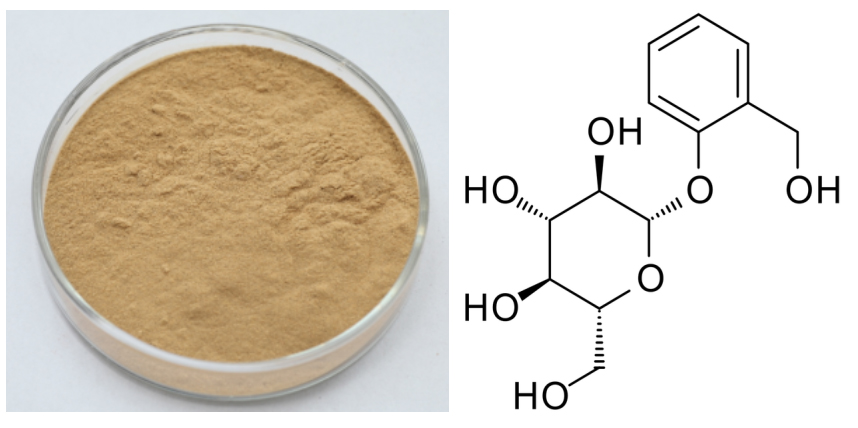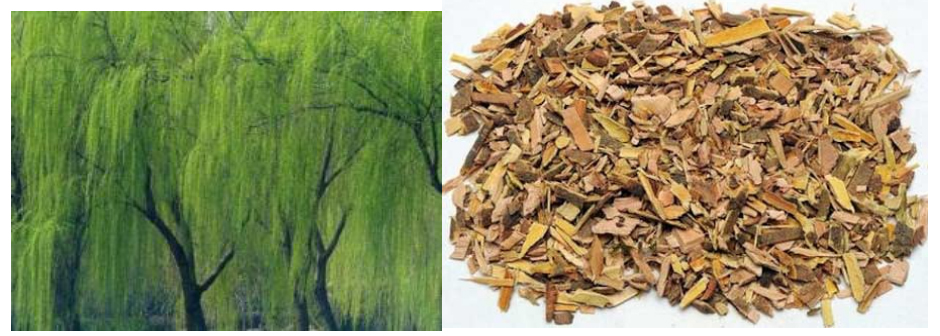Good Quality White Willow Bark Extract Factory from Ireland
Good Quality White Willow Bark Extract Factory from Ireland Detail:
[Latin Name] Salix alba L.
[Plant Source] from China
[Specifications] Salicin 15-98%
[Appearance] Yellow Brown to White powder
Plant Part Used: Bark
[Particle size] 80 Mesh
[Loss on drying] ≤5.0%
[Heavy Metal] ≤10PPM
[Storage] Store in cool & dry area, keep away from the direct light and heat.
[Shelf life] 24 Months
[Package] Packed in paper-drums and two plastic-bags inside.
[Net weight] 25kgs/drum
Brief Introduction
Salicin is a naturally occurring compound found in the bark of several species of trees, primarily North American in origin, that are from the willow, poplar, and aspen families. White willow, from whose Latin name, Salix alba, the term salicin is derived, is the most well known source of this compound, but it is found in a number of other trees, shrubs, and herbaceous plants as well being synthesized commercially. It is a member of the glucoside family of chemicals and is used as an analgesic and antipyretic. Salicin is used as a precursor for the synthesis of salicylic acid and acetylsalicylic acid, commonly known as aspirin.
A colorless, crystalline solid in its pure form, salicin has the chemical formula C13H18O7. Part of its chemical structure is equivalent to the sugar glucose, meaning it is classified as a glucoside. It is soluble, but not strongly so, in water and alcolhol. Salicin has a bitter taste and is a natural analgesic and antipyretic, or fever reducer. In large quantities, it can be toxic, and overdoses may lead to liver and kidney damage. In its raw form, it may be mildly irritating to skin, respiratory organs, and eyes.
Function
1. Salicin is used to ease pain and reduce inflammation.
2. Relieve acute and chronic pain, including headache, back and neck pain, muscle aches, and menstrual cramps; Control arthritis discomforts.
3. Relieve acute and chronic pain.
4. It has the same effect on the body as aspirin without any of the side effects.
5. It is an anti-inflammatory, a fever reducer, an analgesic, an anti-rheumatic, and an astringent. Specifically, it helps to relieve headaches.
Application
1.Anti-inflammatory, anti-rheumatic,
2.Reduce a fever,
3.Use as an analgesic and astringent,
4.Relieve headache,
5.Ease pain caused by rheumatism, arthritis, and carpal tunnel syndrome.
Product detail pictures:
Related Product Guide:
We've numerous great employees customers excellent at promoting, QC, and working with kinds of troublesome difficulty inside the generation method for Good Quality White Willow Bark Extract Factory from Ireland , The product will supply to all over the world, such as: Botswana, Mombasa, Muscat, We set "be a creditable practitioner to achieve the continuous development and innovation" as our motto. We would like to share our experience with friends at home and abroad, as a way to create a bigger cake with our joint efforts. We have several experienced R & D persons and we welcome OEM orders.
https://davesmith.ludaxx.com
https://www.davegsmith.com/
https://bluelineproducts.com/
How it Works for Diet using Sugar Blocker in this area Mobile
Why it Works for
F21 is an All Natural Sugar Blocker that assists restrict your blood sugar level absorption. It includes different substances discovered to have various wellness perks, such as L-Arabinose, Coriolus Versicolor Polysacchride, Konjac-Mannan, Magnesium Stearate, Mint taste: Menthol and Natural Colors. F21 not just does it assist advertise weight-loss, (PSK) enhances your immune system feedback. In fact, for each gram of F21, you can block approximately 20 grams of sugar (sucrose). The formula not just assists advertise weight-loss, it benefits the intestinal system by permitting the obstructed sucrose to sustain helpful probiotic germs while the polysaccharide (PSK) enhances your immune system feedback.
DG Smith https://www.davegsmith.com/
diabetes care :
00:00:05 sugar cravings
00:00:12 safe appetite suppressant
00:00:19 F21 Sugar Blocker
00:00:27 Weigh tloss
00:00:34 Fitness
Just when you thought it was safe to leave the Patch…| Subscribe: https://youtube.com/c/Savortooth
Twitter: https://twitter.com/Savor_Tooth | Facebook: https://facebook.com/SavortoothChef
*Scroll down for full recipe*
Playlists
–Savortooth: https://goo.gl/Q7ab8g
–Bite-Sized: https://goo.gl/8gbwdR
–Secret Menu: https://goo.gl/NQF04a
–Trimmings: https://goo.gl/iqbmMm
____________________________________
Full Recipe
————————
1/2c pumpkin seeds*
1-2tsp water if needed
——–
Chili Lime: Juice of 1/2 lime, 1-2tbsp chili powder, 1-2tsp cayenne pepper, 1/2tsp salt (optional)
——–
Curry Ginger: 2tsp curry powder, 1tsp cumin, 1tsp ground ginger, 1/2tsp turmeric, 1/2tsp salt (optional)
——–
Salt & Pepper: 1-2tsp salt, 2-3tsp black pepper
——–
Sugar & Spice: 1-2tbsp sugar, 2tsp cinnamon, 1tsp nutmeg, 1/2tsp clove, 1/2tsp allspice
Mix seeds w/chosen seasonings, add water until just dissolved.
Marinate 30min.
Preheat oven to 400.
Spread seeds in single layer on parchment-lined baking sheet(s).
Bake 20-25min, let cool.
For Sugar & Spice: Seeds will be stuck together in melted sugar.
Cool completely, lift edges of parchment and fold gently inward.
Pour into bowl and break apart w/handle of wooden spoon.
*A medium-large pumpkin should give you ~2c of seeds. (I used two small ones.)
High Quality, High Efficiency, Creative and Integrity, worth having long-term cooperation! Looking forward to the future cooperation!







